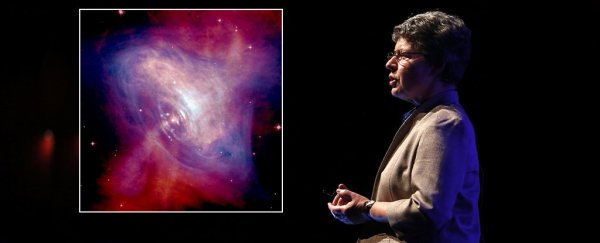Irish astrophysicist Dame Jocelyn Bell Burnell has been awarded a prestigious Special Breakthrough Prize in Fundamental Physics, for discovering pulsars all the way back in 1967.
A Cambridge PhD student at the time, Bell Burnell spotted a faint, repeating signal in the reams and reams of data she had to sift through at the newly opened Mullard Radio Astronomy Observatory.
She was able to characterise the signal as repeating flashes of light from a rapidly spinning star. Pulsars, as these stars came to be known, are a type of neutron star that changed astronomy.
Their pulses are so regular, they can be used as a sort of cosmic clock - and perhaps even a galactic positioning system.
They also helped understand the structure of our galaxy, and help test relativity; in short, they're hugely important objects. And Bell Burnell attributes the discovery to her minority status - an Irish woman trying to gain a foothold in astrophysics in the 1960s.
"It was a very, very small signal. It occupied about one part in 100,000 of the three miles of chart data that I had," she told The Guardian. "I noticed it because I was being really careful, really thorough, because of impostor syndrome."
In 1974, a Nobel Prize in Physics was awarded for the discovery - to Bell Burnell's supervisor Antony Hewish and colleague Martin Ryle. Bell Burnell was not included.
Since then, she has been honoured with a number of awards. The Special Breakthrough Prize in Fundamental Physics, which comes with US$3 million in prize money, has only ever been awarded to three other recipients: Professor Stephen Hawking, the Higgs boson discovery team, and the LIGO collaboration that led to the discovery of gravitational waves.
Bell Burnell already has plans for the money, to be awarded at the Breakthrough Prize Ceremony on November 4. She intends to donate it to the Institute of Physics to fund PhD studentships for minority applicants.
"I found pulsars because I was a minority person and feeling a bit overawed at Cambridge. I was both female but also from the north-west of the country and I think everybody else around me was southern English," she told the BBC.
"So I have this hunch that minority folk bring a fresh angle on things and that is often a very productive thing. In general, a lot of breakthroughs come from left field."
